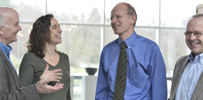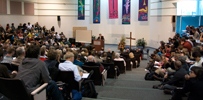More Than Just the Guy In Line
October 13-19 was Homelessness Action Week in Vancouver, BC. We asked faculty member and life-long resident of Vancouver, Gerry Schoberg, for his perspective on homelessness and a bit about what his church is doing to address this very present reality.
Question: How would you define homelessness in Vancouver?
GS: There are two kinds. There are “street people” who don’t have a place of their own to go to, so they’re either living quite literally on the streets or they’re in shelters. And then there are homeless who don’t have their own place so are staying with friends, but it’s not a permanent situation.
Question: From your observation, what would you say are the primary causes people find themselves in one of these two situations?
GS: The primary cause is affordability of housing. This goes back to the 1980s when land and building prices started to increase. They’ve continued to increase exponentially, much more so than income or welfare and social assistance have. That has particularly hurt people on the margins.
Question: Who would you say are on the margins?
GS: Quite a variety of people. Those who haven’t been able to find work for one reason or another - perhaps they don’t have the qualifications or skills so they can’t get a good job. Many people can get a $10/hour job, but that doesn’t get you very far. Also, when some of the mental health facilities in Vancouver closed, those people were put into housing, but services for them haven’t kept up with their needs. So many have found themselves homeless.
Question: It’s interesting that you say housing affordability is the leading cause of homelessness. Most of us walking down the street simply assume that homeless people got that way because of their bad choices, drug addictions, and crimes.
GS: Homelessness has a nexus of things associated with it and drug and alcohol abuse is one of them. The odd thing is that, say in the downtown Eastside where there is a lot of drug use, there is also a kind of community there; people do find a sense of belonging with those people and with those streets. It’s really hard to kick the habit because that means leaving your community.
But when we’re talking about those trapped in a drug abuse situation, it’s not the majority of the homeless in Vancouver. The drug problem needs to be solved, but there are a whole variety of other things to overcome. For example, how do you integrate into a life that involves a place to live, a place to work, a bank account, shopping for groceries – all these new things?
Question: Tell me a bit about what your church is doing to help resolve these issues in Vancouver.
GS: Our church has a double lot at the corner of 1st Ave and Victoria that we intend to develop for social housing. Over the years, we’ve gained experience through some integrated social housing “experiments” involving people in our church, as well as through a weekly meal we served to the homeless.
We learned in the housing experiment that it’s all very well and nice to think about people living in community, but there is also “mess”. People need privacy and a space of their own–security. In regards to the meal, we realized that the homeless were coming back each week, each year, in exactly the same situation. So we made some changes to encourage more of a buy in, more of a community. We think this is a better model for creating lasting change.
Question: How will these lessons learned apply to your social housing endeavor?
GS: We’ve designed the building so that there’s private space, but also community space where people can come together. Residents will have their own suites but cooking and fellowship space will be in common.
Question: What will the housing mix be?
GS: Twenty spaces will be low income social housing, and six spaces will be reserved for “co-residents”. We want to avoid a kind of paternalistic structure, but we do want some people there to be facilitators of community and resource people for the residents when they have a problem. We want them to be people who live and walk alongside, but we don’t want them to be parents. We’re trying to find this balance between independence and community.
Question: Who do you envision living there?
GS: We are designing the housing to be diverse. There will be room for seniors, single women, single men, and families. We understand from the beginning that we cannot address people who have significant addiction issues, but we can address people who are living in other’s homes. This can be a step to more stability.
Question: What was the motivation for embarking on this project?
GS: A number of years ago we started to ask the questions: “How should we be because we are in this particular neighborhood, and how should the neighborhood we’re in be different because we’re here?” Those were very fundamental questions for us. It led to people in the church choosing to live in that neighborhood. Through this, we realized that there were homeless people around. And if the primary issue of people who are homeless, who want to get out of homelessness, is affordable housing, then could we do something about that?
Question: Most of us don’t attend a church like yours. How can those of us who feel disconnected and powerless in the face of homelessness help?
GS: It’s always a dilemma to know how to help the homeless you walk by in the street. Do you give money when some people are just going to take that money to get another shot of heroine? On the other hand, we must not, as Christians, give the impression that Christianity is not about generosity. So we find ourselves trying to work it out in the middle. What is really helping?
First, then, you can get educated about the issue and keep it on the agenda at your church. Secondly, If we’ve learned about the issues we can get involved politically by knowing when issues are coming up at City Hall, writing to our MLAs and MPs, and asking election candidates about their plans for homelessness. These are ways of keeping the issue on the public agenda, because it’s very easy to drive past and not notice; that’s what a lot of us do. Thirdly, there are organizations to volunteer with that deal with a wide variety of aspects of homelessness.
Question: What is one thing you think the average city-dweller needs to know about homelessness?
GS: Relationships are key in getting away from homelessness. They help to provide stability and hope; they help one’s determination to make life better. Developing relationships is important – if they can be non-paternalistic relationships, those are best. But it’s really hard; you meet a homeless person and what do you talk about? You’ve got nothing in common. Having people walk alongside provides the opportunity to develop better relationships, friendships, and encouragement. Volunteering situations allow you to do that, as well. You meet these people every day, you learn their names, you notice when they’re not there and you mention it next time you see them – they become something more than just the guy in line.
Dr. Gerry Schoberg is the Senior Academic Administrator at Regent College. In addition, he teaches a variety of courses in New Testament and Biblical Languages. Dr. Schoberg most recently published Perspectives of Jesus in the Writings of Paul.
Visit Regent Audio to hear Gerry give a lecture.




